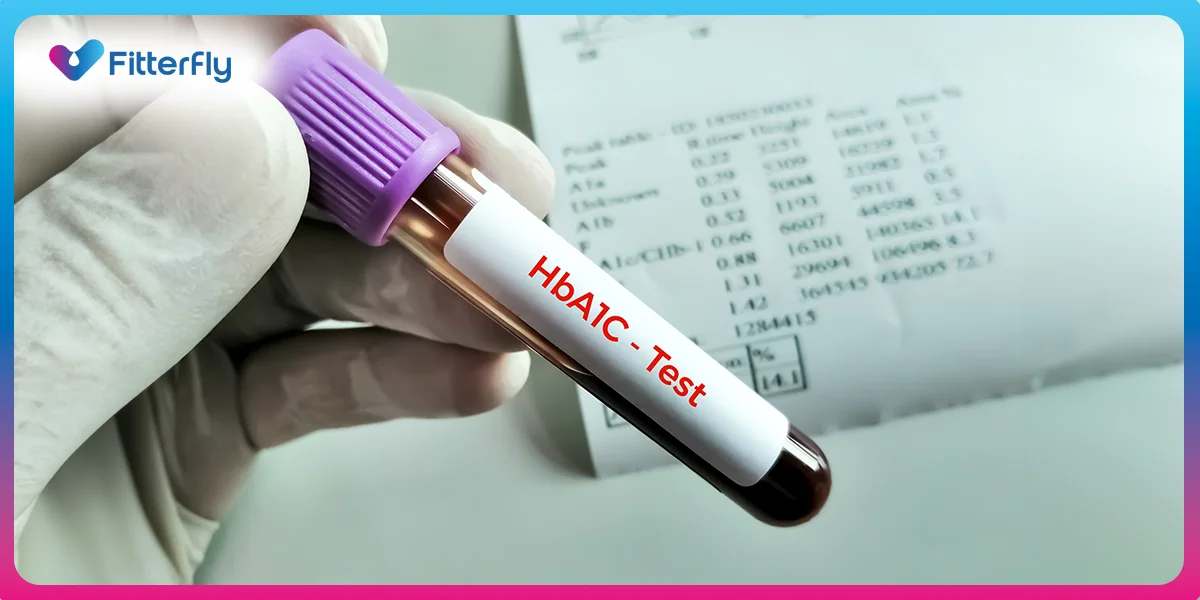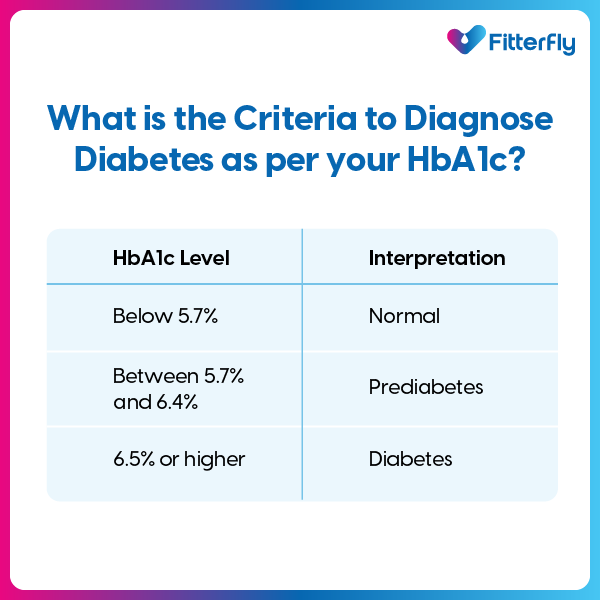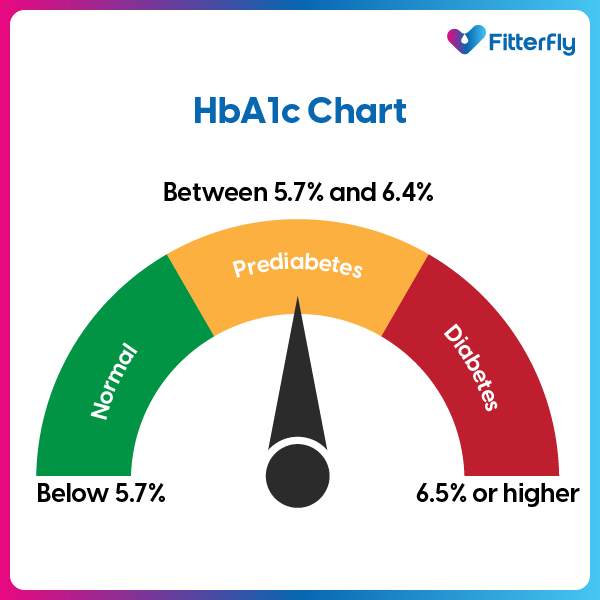HbA1c: Understanding the Test, Alarming Levels, Factors, and Limitations

Scenario 1: Mr P, a 37-year-old man, underwent a routine health checkup. The reports stated that his fasting blood sugar levels were high.
He was sure he now had diabetes and reported to his doctor. To his surprise, his doctor asked him to get his HbA1c test done to confirm if he had diabetes.
Scenario 2: Mrs Y, a 50-year-old woman living with diabetes for the past 7 years, underwent a regular diabetes test to measure her blood sugar levels. In the past few years, since her diabetes was diagnosed, Mrs Y has continued taking fasting and post-prandial blood sugar levels.
However, she was surprised when her doctor asked her to get an HbA1c test to check her average blood sugar control.
There are two different scenarios, but one common link- is an HbA1c test. Wondering why this test is important? Let’s help you understand why we need HbA1c and what the need for it is!
What is HbA1c?
An HbA1c test is a blood test that gives your average blood sugar or glucose levels over the past two to three months.
Sugar or glucose in the blood binds to hemoglobin, a type of protein found in the red blood cells (RBCs). As your blood sugar levels increase, more hemoglobin gets attached to glucose.
Therefore, an HbA1c test measures the number of RBCs that contain glucose-coated hemoglobin. For this reason, an HbA1c test is also called a glycated hemoglobin test.
Since the life of RBCs is 120 days, an HbA1c test gives an average blood sugar level of the past two to three months.
What are the Criteria to Diagnose Diabetes as per your HbA1c?

What is the ideal Hba1c you need to maintain if you have diabetes?


HbA1c is a useful tool to determine if you maintain your blood sugar levels as per the target. ADA recommends keeping your HbA1c less than 7%.
Your target HbA1c may vary depending on age, comorbidities, and complications. The target HbA1c is higher for the elderly.
When is an HbA1c Level Test not Helpful?
A 45-year old man underwent a regular health checkup as part of his corporate package. When the reports came, he was shocked. His blood sugar report stated, “HbA1c is not detected”. Worried, he rushed to his doctor.
- In certain situations, your HbA1c may not be detected. In these situations, your doctor may recommend undergoing an Hb electrophoresis test to confirm a diagnosis of hemoglobinopathies like sickle cell anemia, thalassemia, and Hb E Disease.
- If hemoglobinopathy has been confirmed, avoid the HbA1c test. Your doctor may recommend a fructosamine test that gives you an average blood sugar level for 6 weeks.
- In these situations, it is advisable to perform self-monitoring of blood sugar levels and keep your sugar under control.
To know your chances of Diabetes reversal, take the Diabetes Reversal TestDiabetes Reversal
Calculator
What is a Dangerous Level of A1c?
There are no dangerous levels of HbA1c. However, Hba1c tells you about your average blood sugar control.
If you get two or more HbA1c readings over 8.5%, it is an alarming situation when it is accompanied by symptoms of high blood sugar levels. When HbA1c levels are alarmingly high, It increases your chances of developing complications of diabetes in the future.
Complications of High HbA1c levels?
High HbA1c levels indicate high blood sugar levels. Complications of high HbA1c and uncontrolled sugars include:
- Diabetic Ketoacidosis
- Hyperosmolar Non-Ketotic Coma
- Nephropathy (kidney damage)
- Neuropathy (nerve damage)
- Retinopathy (eye or vision damage)
- Foot problems (diabetes-related foot ulcer)
- Stroke or heart attack
- Gum diseases
- Sexual dysfunction (in some individuals)
These complications of high blood sugar levels can develop over a period of time if they are not corrected with the right measures.
What Factors Help You Maintain Normal HbA1c Levels?
If you have been diagnosed with high HbA1c levels, here are some tips to bring it within the optimum range:
- Lifestyle modifications: Eating a healthy diet (prescribed by a dietician or your diabetologist), maintaining portion control, regular exercise, good sleep, and keeping your stress levels to the bare minimum.
- Know your target HbA1c levels.
- Regular monitoring of HbA1c levels.
- Self-monitoring of blood glucose levels (SMBG) or continuous glucose monitoring under the supervision of your doctor.
- Follow the treatment plan and take your medicines as prescribed by your doctor.
Limitations of HbA1c Test
Though HbA1c is the most reliable test in order to diagnose or check your average blood sugar control, it has a few limitations:
1. False High or Low Results:
When an individual has anemia or other hemoglobinopathies, HbA1c is undetected. When this happens, these individuals are more dependent on lab testing, fructosamine test (gives a 6-week average of blood sugar levels), and self-monitoring of blood glucose (SMBG).
2. Pregnancy
HbA1c levels are not dependable during pregnancy; therefore, other tests like fasting or oral glucose tolerance (OGTT) are used.
3. Alternative forms of Haemoglobin
Few groups of people, especially in the North-Easten part of the country, have different alternative forms of hemoglobin. In these individuals, an HbA1c test would usually appear as ‘undetected’.
In fact, an HbA1c test may help people know about their hemoglobin type.
FitterTake
HbA1c levels provide an average of your blood sugar levels over the past 30 to 60 days. This allows individuals and their healthcare providers to understand their blood sugar control- whether they have diabetes or not.
Therefore, regularly monitoring your HbA1c levels and following your doctor’s guidance can help people maintain their blood sugar levels within the HbA1c normal range and prevent diabetes-related complications.
If your high HbA1c levels are stressing you out, sign up for Fitterfly’s Diabetes Care Program. To know about the program or consult with our experts more, speak to us or you can just give a missed call at 08068507599 to know more.
This blog provides general information for educational and informational purposes only and shouldn't be seen as professional advice.
REVERSED Diabetes in 3 months


Happy members
EMI
Guarantee
4.8/5
Diabetes Prime Program




















